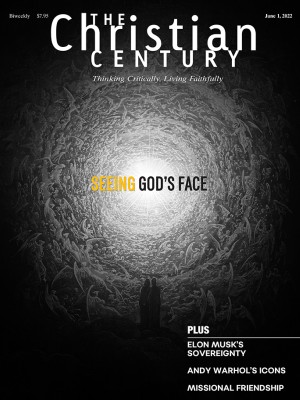June 19, Ordinary 12C (1 Kings 19:1-15a)
God never intended for Elijah to carry the full weight of challenging the halls of power.
The famous Simon and Garfunkel song “The Sound of Silence” explores the difficulty of communicating truth in a way that will be heard. While it may be easier to believe that truth is told in the booming shouts of the powerful, in fact it is often uttered in the whispers of the vulnerable: “The words of the prophets / Are written on the subway walls / And tenement halls / And whispered in the sound of silence.” They were not the first to make this claim.
Elijah’s prophetic role was to call out the idol worship rampant in the kingdom of Israel and perpetuated by those in power, namely Ahab and Jezebel. The prophet we encounter in 1 Kings 19 stands in stark contrast to the prophet spoken of in the previous chapter, whose zeal and swagger on behalf of God clinches victory over the prophets of Baal, even amid seemingly asymmetrical warfare tipping in Baal’s favor. When Elijah hears of the death warrant Jezebel has placed on his head, his demeanor flips from empowered and confident to helpless and disconsolate. As readers, we are left to guess why.
Read our latest issue or browse back issues.
Perhaps Elijah thought God’s victory would get through to Ahab and his administration, and when he learns of Jezebel’s crusade to kill him, he realizes his truth telling has reverberated in ears that refuse to hear. Elijah flees to the wilderness—not necessarily for his life, as he asks God to let him die. He is hoping for escape from his calling, feeling overwhelmed by the task ahead, mistakenly believing that he alone must eradicate idolatry.
Notably, God does not shame Elijah for his despair. Rather, God nourishes him with food and water, allows him a 40-day retreat, and coaxes him out of his cave in an unexpected way. Elijah finds God not in the powerful wind, earthquake, or fire but in the qol demamah daqah, the “sound of sheer silence.”
Commentators debate the theological meaning of this phrase. I take the view that the text implies God’s presence in silence as opposed to in the standard pomp and circumstance of elemental brilliance. That Elijah encounters God in silence and receives direction through this encounter reminds readers that powerful leaders like Ahab and Jezebel ignore the prophetic voice of political dissenters and the vulnerable. Additionally, God’s presence in the sound of sheer silence serves as a foil to the way Baal worshipers like King Ahab and Jezebel both rule and conceive of divine power.
God then instructs Elijah to return to the work of his calling and to mentor a new prophet, Elisha. Elijah must complete his portion of the task at hand, but God assures him there are others called to the work as well. It turns out God never intended for Elijah to carry the full weight of challenging the halls of power on his own shoulders.
In our time, we seem to be trampled down by a cavalry of bad news every day. Even if we didn’t carry the ups and downs of COVID-19 trends in the background, daily notifications of injustice, violence, and human suffering demand our constant attention. If it isn’t a rise in cases due to a new COVID-19 variant, it’s a humanitarian crisis like the Putin administration’s invasion of Ukraine. If it’s not a new, bleak warning about the impending climate crisis, it’s a death-dealing policy against transgender youth.
The magnitude of the work God calls people of faith to do is so overwhelming that many of us feel the learned helplessness and powerlessness of Elijah. What can we, as individuals, possibly do to make even a dent in the injustices God calls us to challenge? The sheer enormity of the task, the willful ignorance of those with institutional power, and the lie that we must work alone all present us with the temptation of fleeing to our caves and abandoning our call.
In particular, the ongoing work of antiracism in all facets of American society—the workplace, the criminal justice system, and the voting booth, to name a few—feels insurmountable. This Sunday is Juneteenth, the commemoration of the 1865 announcement to the last enslaved people in Texas that the Civil War had ended and they were free. While rightfully observed as a celebration for Black Americans, Juneteenth should also serve as a reminder to White Americans of both the long prevalence of the shameful evils of racism and the work that remains to be done.
The idols we’re called and equipped to resist today are neither the biblical Baal nor Paul Simon’s neon sign. They do include the gods of White supremacy and capitalism. As individuals, we will grow weary of challenging such idol worship, especially when to do so is to call out those who wield the most power, even in the institutional church. God, however, does not release us from our responsibilities. As the Pirkei Avot says, “You are not obligated to complete the work, but neither are you free to desist from it.”
Elijah’s encounter with God in the sound of sheer silence offers us nourishment and hope as we peer out from our caves, overwhelmed by all the work God has left for us to do. When dismayed, we need only remember who to listen to for God’s voice.




